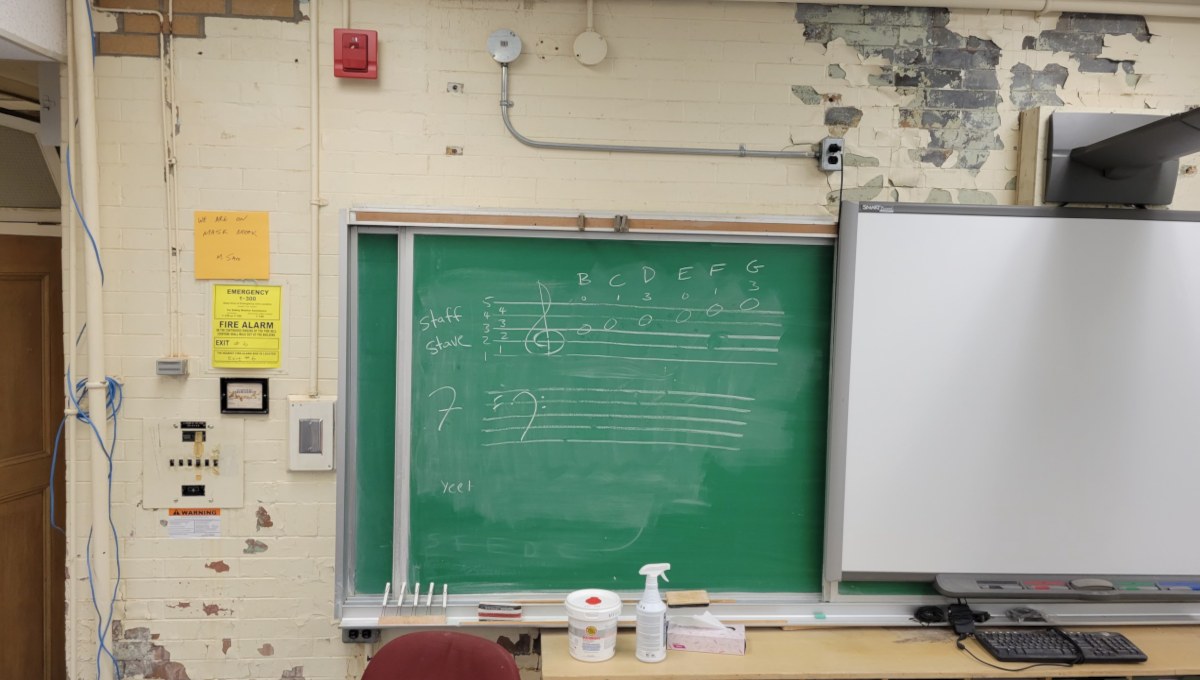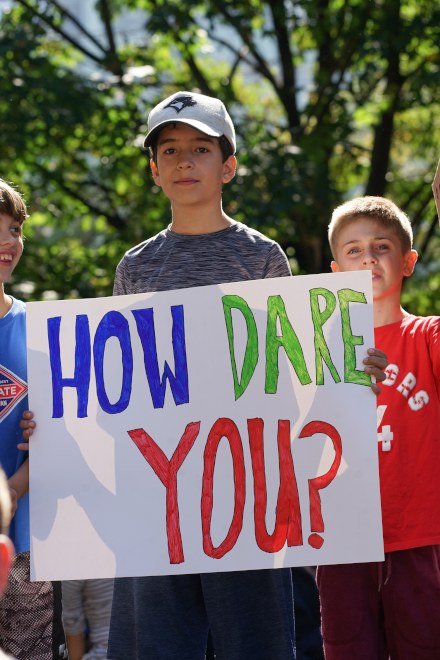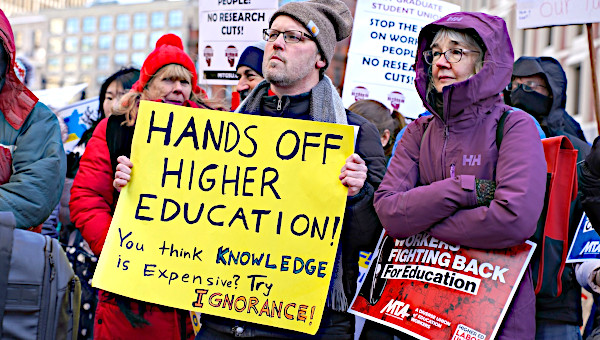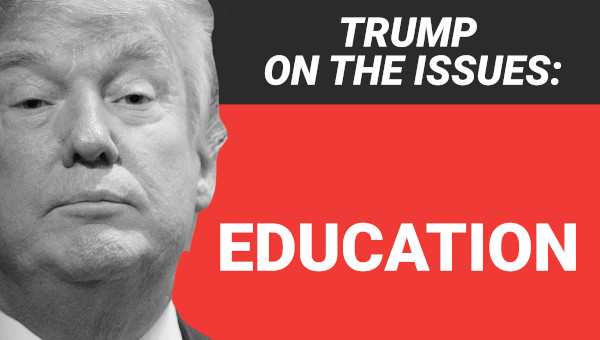The Better Schools and Student Outcome Act: Crushing What’s Broken
Ontario Education Minister Stephen Lecce must really want to be a magician – making elephants or something outlandish disappear, then reappear behind you. Maybe that explains his tactic of making cuts to education, then announcing the addition of nearly 2,000 more educators all while introducing new legislation that will further centralize education and enable his Tories to make school properties available to their developer friends.
Actually, he’s not a great magician, but Mr. Lecce certainly knows how to wrap everything up into a big ball of mess in order to distract people from seeing what’s really going on.
On Sunday (April 16th), he announced his new math and literacy plan, telling reporters that the Ministry would be spending $71-million for math and another $109-million for literacy over 2023-24 to improve results for just over 2 million students in Ontario public schools who have faced three years of disrupted teaching over COVID. This money should provide for new lessons, new tests and 1,000 staff. But with 4,832 public schools across the province that comes to about 1 staff member for every 5 schools. NDP Education critic, Chandra Pasma called it a drop in the bucket in a time of crowded classrooms and limited supports. “It’s incredibly frustrating as a parent and an education critic.”

Something Must Be Done
On Monday (April 17th), Mr. Lecce, with hand over heart, declared at a press conference that “fundamental skills have regressed” amongst students and that something must be done right away because “schools need to be emphasizing and focusing on strengthening skills that matter to parents.” God help us all, the solution for this quagmire of ignorance is Bill 98, The Better Schools and Student Outcomes Act, whose primary purpose, apart from the smoke and mirrors of accountability, building more schools and so on is to centralize education in Ontario more than ever. If Mr. Lecce had the capacity to be really honest, he would drop school boards altogether and run education directly from Queen’s Park.
And just to make sure that he couldn’t be accused of being miserly, he announced funding for 940 educators across the province to help students from grades 7 to 10 adjust to highschool and de-streamed courses.
Sounds great, right? Heaven knows, we need more responsible adults, other than Tories, involved in education. But there are these nagging questions: Who are these educators? How will they be trained? Are they teachers? If they’re not, is this just another way to pay them less for teaching?
Context is Critical
What about the context of these announcements? The government that plans to spend a bit of money on literacy and numeracy next year is the same one that increased class sizes in 2019, while planning to cut over 10,000 teachers, though it backed down a bit – for now – in the face of teacher strikes. It cut $430-million from schools in 2019-20 and another $500-million in 2021, despite receiving $14.6-billion from the federal government for COVID support. In early 2021, the Ministry blithely warned school boards not to count on the $1.6-billion “one-time” funding for COVID support used to hire about 7,000 educators. That COVID support money is zero in the 2023-24 provincial budget. After 3 years of pandemic, the Ford government cut $800 from the grant for each student in the province. The Tories have consistently cut these Grants for Student Needs (GSNs) since they took over at Queen’s Park in 2018.
Then there’s inflation – a concept the Tories appear unwilling to grasp when considering funding. In an article published yesterday, Ricardo Tranjan of Canadian Centre for Policy Alternatives (CCPA) describes the fiscal crisis at the Toronto District School Board (TDSB). For the 2018-19 school year, the TDSB received $12,390 per student:
“Between March 2018 and March 2023, the Consumer Price Index (CPI) increased by 16.9 per cent – meanwhile, the board’s per-student allocation went up by less than half of that, 7.9 per cent. The upshot: the board will receive $1,110 less per student in 2023-24, in inflation-adjusted terms, compared to what it counted on in 2018-19. For a large board like the TDSB, this funding cut adds up to nearly $260-million a year in real dollars.”
It only gets worse when you consider that the TDSB, like other boards, had to dip into its reserve funds to the tune of $70-million, because the Ford government wasn’t willing to cough up the money needed to handle COVID costs. Right now, it faces a deficit of about $61-million dollars and is going begging to the Ministry of Education for relief.
Making Good Use of the Crisis Tories Created
Rather than spouting off nonsense about all it was doing to help kids meet provincial standards, the Ford government could have taken some practical measures to improve the post-COVID situation in schools across the province. It could, for example, have followed the Elementary Teachers Federation (ETFO) recommendations to cap grades 4 to 8 classes at 24 students, or to cap Kindergarten classes at 26. For kids who are having challenges in school, it could have based special education grants on actual students’ needs, rather than a formula. It could have moved some funding over to boards to hire more education assistants, psychologists, behavioural therapists, child and youth workers, support counsellors and speech/language pathologists.
But why waste an opportunity to grab power when the schools are facing a crisis, substantially contributed to by your government. Behind the curtain of hoopla is The Better Schools and Student Outcomes Act more accurately described as the Further Reduction of Schools Boards’ Ability to Function Act. Essentially, it gives the Minister of Education a lot more scope to meddle in the affairs of school boards. This is after they’ve been gutted over the years by successive governments whose interest in sustaining them is, really, only to give the pretence of local involvement in schools while keeping angry parents away from the Ministry of Education.
Here are some key points. The act lets the Minister issue more policies and guidelines concerning review of curricula used by boards– not that this has ever been an issue, other than through the Ministry’s intransigence in areas like Indigenous curricula. The legislation makes boards responsible for providing what it cryptically calls “equivalent apprenticeship learning” though there’s no mention of issues like training or safety for students working outside schools. Though school boards already publish and monitor multiyear plans to promote student achievement and well-being, the government known for cutting education wants to be able to send in unspecified support personnel, if the “Minister is unsatisfied with the board’s progress.”
The legislation sets rules about materials and timing for boards to communicate with parents, though they already do this. It monitors low-paid trustees and bureaucrats alike in creating policies “setting out the training to be completed by board members, directors of education, supervisory officers and superintendents.” Elected officials will now be trained according to Ministry diktats. Another interesting feature is that the Ministry plans to charge boards “a fee for the evaluation of textbooks, reference books or other reference materials.” It already has the power to approve the materials students use to learn in school; now it plans to charge for it.
The Education Act already lays out rules for conduct of school board members, but the Better Schools and Student Outcomes Act changes this by taking breaches of conduct out of the hands of the board if they aren’t resolved within ten days. At this point an integrity commissioner, chosen from a roster maintained by the Minister of Education, investigates the matter and has the final say over the outcome. This same commissioner can examine any records they deem relevant and “require any officer of the board or any other person to appear before him or her and give evidence on oath or affirmation, relating to the investigation.” So, what we have here is an extra-judicial subpoena process. Hopefully, when this measure is challenged, Doug Ford won’t use the “notwithstanding clause” to override any judgement against his government.
School Board Properties

The most gob-smacking statement to come out Mr. Lecce’s mouth on Monday was, “We are responding to the many families who feel like it takes too long to build a school in this province. We’re going to streamline the process to improve and build schools.” This is the same man, currently presiding over a near $17-billion backlog in school repairs while offering in his most recent budget $15-billion over ten years to catch up.
Of course, his goal is not to provide more money or to work with school boards and communities to resolve the worst issues. His goal is to take more power back to the government: “The Minister may direct a board to sell, lease or otherwise dispose of a school’s site or other property of the board if it is not needed to meet current or future pupil accommodation needs…” By the way, the Minister gets to decide issues like sale or lease price and what the board may do with the money that might come to it. Even more significant would be the Minister’s new power to make rules “respecting to whom sites or parts of school sites or property may be offered.” At Monday’s press conference, Mr. Lecce was talking about two boards in the same area sharing schools, or maybe one board working with a local community centre to build a multi-use facility. It sounds good. The TDSB already does that.
Imagine the possibilities for developers. Asked whether a board property could be sold or used some other way by a private company, Mr. Lecce didn’t say “no”. Consider this: the Toronto Catholic DSB (TCDSB) currently plans to build a new school on a piece of property just north of Christie Pits in downtown Toronto. There used to be a school there but the TCDSB tore it down and moved students into a school not far away. Given this new legislation, it looks like the Tories could come in, demand that the Toronto Catholic DSB sell that property to a developer who could then put up a very profitable condo overlooking the baseball field at Christie Pits. It’s the education version of Highway 413.
Since the Harris days, the Ministry of Education has acted the bully, breaking the legs of schools and school boards and then without a shred of irony saying: “You really need to shape up.” It forced amalgamation of school boards, took away their ability to raise tax money, centralized their operations and let buildings fall apart while it endlessly cut funds, prescribed limited curricula with questionable high stakes testing to go with it. It went after teachers and education workers, limited access of parents to have a say in the work of their schools, then undercut public education itself by introducing online teaching and paying parents up $250 for private tutoring.
Now in the pious words of Stephen Lecce, it will “set clear expectations and priorities for student achievement to ensure that boards across the province are unified in their focus.” What hypocrisy. •
This article first published on the School Magazine website.





